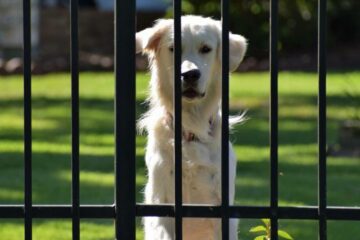Older Dog Barking at Puppy: What’s Happening + How to Stop!
Navigating the dynamics between a senior dog and a new puppy can be challenging, especially when you have the older dog barking at the puppy. Today, we’ll explain why your older dog barks at your new puppy and the signs that indicate if this behavior might escalate.
You’ll learn how to use the “Quiet” command effectively to manage your older dog’s barking. We’ll then guide you through the process of introducing your senior dog to the new puppy, distinguishing between playful and aggressive behaviors, and understanding why your older dog may not instantly warm up to the new family member. Keep reading!
Older Dog Barking at Puppy

When you have an older dog barking at a puppy, it’s often a communication of boundaries or discomfort. This behavior is not unusual as the older dog may be adjusting to the energy and behavior of the puppy. It’s important to understand why the older dog is barking and to ensure that both dogs feel safe and comfortable in their shared environment.
Why Does My Older Dog Bark at My Puppy?
Your older dog barks at your puppy primarily as a form of communication, expressing either discomfort, playfulness, or a need for space. Older dogs might find puppies’ energy levels and play style overwhelming. They may bark to teach the puppy about boundaries and acceptable behaviors, or simply to assert their own comfort levels.
Signs Old Dog Barking at Puppy Will Escalate
It’s important to recognize signs that barking may escalate into aggression. These include a stiff body posture, growling, baring teeth, or snapping. If the older dog’s barking is accompanied by these behaviors, it indicates increasing discomfort or stress, and you should separate them right away to prevent any potential conflicts.
Older Dog Barks at Puppy: Training “Quiet”
Training the “quiet” command is very helpful in stopping your older dog barking at your puppy.
- Start by allowing your older dog to bark a few times, then say “quiet” in a calm, firm tone.
- When your dog stops barking, immediately reward them with a treat or praise to reinforce the behavior.
- Practice this regularly, gradually increasing the time your dog remains quiet before receiving a reward.
This training helps in controlling excessive barking and promotes a peaceful coexistence between your older dog and the puppy.
In summary, an older dog barking at a puppy is a normal behavior that serves as communication and boundary-setting. Recognizing when this behavior may lead to aggression is crucial for the safety and well-being of both dogs.
Training the older dog to respond to the “quiet” command can effectively manage their barking, but it’s important to remember that the underlying behavioral issues (anxiety, territoriality, aggression, etc.) that were causing all of this to begin with will still be present.
And until you address those, any positive changes you see will only be temporary.
“Well, how do I make these changes last?”
By getting your dog to truly choose to follow your direction, that’s how. I tried many times to write out how you can do that before deciding it made more sense to just link you to the free video series that explains it better than I’d ever be able to.
The series is by a man named Dan who is one of the world’s leading dog obedience trainers. In it, he teaches you how to put an end to things like your senior dog barking at your puppy and all other misbehavior using his fast and easy-to-follow methods.
In the first video, Dan will reveal to you why the two most common methods of dog training only doom you to failure. You can watch the video now by clicking here. Follow the proven system he’ll show you in his series and you’ll never have to spend another second worrying about your older dog barking at puppies ever again!
Dog Keeps Barking at New Puppy: Introductions

If your dog keeps barking at a new puppy, it’s normally a sign that they are trying to communicate. This behavior can stem from excitement, uncertainty, or a need to establish boundaries. It’s important to monitor their interactions closely to understand the underlying reasons and ensure a smooth introduction process.
Older Dog Barks at Puppy: Playing or Aggression?
Determining whether an older dog’s barking at a puppy is playful or aggressive depends on their body language and the context. Playful barking is usually accompanied by a relaxed body, wagging tail, and inviting gestures like play bows.
In contrast, aggressive barking may involve stiff posture, snapping, and intense staring. Understanding these cues helps you to determine when introductions should be cut short. You should know the “quiet” command so that you’re able to diffuse these situations. Learn it now in the first section.
How to Introduce Senior Dog to New Puppy
Introducing a senior dog to a new puppy should be done gradually and calmly. Start by allowing them to smell each other’s scent through a barrier or by swapping bedding. The first face-to-face meeting should be in a neutral area (such as the park), with both dogs leashed for control.
Ensure the first encounter is brief and positive, and then gradually increase their time together as they become more comfortable with each other. Always supervise these interactions.
Why Does My Dog Not Like My New Puppy?
Your dog may not immediately take to a new puppy due to jealousy, a disruption in routine, or discomfort with the energetic nature of puppies. It’s important to give your older dog time to adjust and ensure they still receive attention and care. Gradual and positive introductions can help in building a harmonious relationship between them.
In conclusion, a dog barking at a new puppy during introductions is not uncommon and can be due to various reasons. It’s important to interpret their body language to understand whether it’s playful or aggressive. Make sure you know the signs of aggression and how to calm your dog if necessary.
Properly introducing them, considering each dog’s comfort level and maintaining routine and attention for the older dog, are key steps in fostering a good relationship between your canine companions.
I’m sure you’re ready to get going now that you have all of your questions about why your senior dog barks at your puppy answered, so I’ll let you begin. Good luck, and thanks for reading our article “Older Dog Barking at Puppy: What’s Happening + How to Stop!”.





